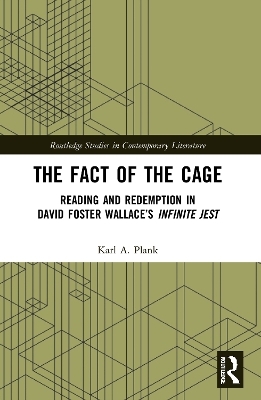
The Fact of the Cage
Reading and Redemption In David Foster Wallace’s "Infinite Jest"
Seiten
2023
Routledge (Verlag)
978-0-367-69887-4 (ISBN)
Routledge (Verlag)
978-0-367-69887-4 (ISBN)
Plank’s study makes the case that reading fiction matters, that reading David Foster Wallace’s Infinite Jest is a stubborn act of ethical and religious significance, that the trek through its many pages may, in the end, redeem its reader from the lethal loneliness that is "the fact of the cage."
David Foster Wallace’s Infinite Jest raised expectations of what a novel might do. As he understood fiction to aim at what it means to be human, so he hoped his work might relieve the loneliness of human suffering. In that light, The Fact of the Cage shows how Wallace’s masterpiece dramatizes the condition of encagement and how it comes to be met by "Abiding" and through inter-relational acts of speaking and hearing, touching, and facing. Revealing Wallace’s theology of a "boneless Christ," The Fact of the Cage wagers that reading such a novel as Infinite Jest makes available to readers the redemption glimpsed in its pages, that reading fiction has ethical and religious significance—in short, that reading Infinite Jest makes one better. As such, Plank’s work takes steps to defend the ethics of fiction, the vital relation between religion and literature, and why one just might read at all.
David Foster Wallace’s Infinite Jest raised expectations of what a novel might do. As he understood fiction to aim at what it means to be human, so he hoped his work might relieve the loneliness of human suffering. In that light, The Fact of the Cage shows how Wallace’s masterpiece dramatizes the condition of encagement and how it comes to be met by "Abiding" and through inter-relational acts of speaking and hearing, touching, and facing. Revealing Wallace’s theology of a "boneless Christ," The Fact of the Cage wagers that reading such a novel as Infinite Jest makes available to readers the redemption glimpsed in its pages, that reading fiction has ethical and religious significance—in short, that reading Infinite Jest makes one better. As such, Plank’s work takes steps to defend the ethics of fiction, the vital relation between religion and literature, and why one just might read at all.
Karl A. Plank is the J.W. Cannon Professor of Religious Studies at Davidson College, USA. The author of Paul and the Irony of Affliction and Mother of the Wire Fence: Inside and Outside the Holocaust, he has published studies in journals such as Religion and Literature, Literature and Theology, Anglican Theological Review, and Cistercian Studies.
Introduction: In Praise of One Good Reading
1. Reading to Become Better: An Approach to Infinite Jest
2. The Predicament of Encagement
3. Contending with the Cage: Abiding and Breaking Through
4. The Redemption of Boneless Christs
5. The Redemption of the Reader
| Erscheinungsdatum | 11.03.2021 |
|---|---|
| Reihe/Serie | Routledge Studies in Contemporary Literature |
| Verlagsort | London |
| Sprache | englisch |
| Maße | 152 x 229 mm |
| Gewicht | 294 g |
| Themenwelt | Geisteswissenschaften ► Philosophie ► Ethik |
| Geisteswissenschaften ► Religion / Theologie | |
| Geisteswissenschaften ► Sprach- / Literaturwissenschaft ► Anglistik / Amerikanistik | |
| Geisteswissenschaften ► Sprach- / Literaturwissenschaft ► Literaturwissenschaft | |
| ISBN-10 | 0-367-69887-0 / 0367698870 |
| ISBN-13 | 978-0-367-69887-4 / 9780367698874 |
| Zustand | Neuware |
| Haben Sie eine Frage zum Produkt? |
Mehr entdecken
aus dem Bereich
aus dem Bereich
unsere kollektive Verantwortung
Buch | Hardcover (2023)
wbg Theiss in Wissenschaftliche Buchgesellschaft (WBG) (Verlag)
CHF 46,90


